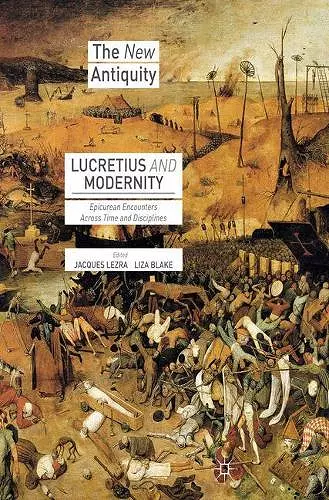Lucretius and Modernity
Epicurean Encounters Across Time and Disciplines
Jacques Lezra editor Liza Blake editor
Format:Paperback
Publisher:Palgrave Macmillan
Published:16th Feb '16
Currently unavailable, and unfortunately no date known when it will be back

"In a series of masterful essays, Lucretius and Modernity offers an astutely philological and multidisciplinary assessment of the pertinence of De rerum natura, both how the work anticipates a variety of conceptions of modernity and how modern readings activate striking latencies contained in this singular Latin poem. Much more than a straightforward account of reception history, this exemplary collection radically presses the limits of reading the past in the present and the present in the past." - John T. Hamilton, William R. Kenan Professor of German and Comparative Literature, Harvard University, USA "The return of Lucretius has been one of the more remarkable developments in the humanities over recent years. This scintillating collection offers diverse and focussed challenges to rethink how responses to Lucretius have shaped, and continue to shape, our sense of the Western intellectual tradition." - Duncan F. Kennedy, author of Rethinking Reality: Lucretius and the Textualization of Nature "Lucretius, writing in the first century before the Common Era, is one of our greatest philosophical contemporaries. He teaches us how to think the atom, the swerve and accident, and freedom: this book, taking stock of the poem's reception across disciplines and periods, persuades us with great force of Lucretius's continuing modernity." - Barbara Cassin, Director of Research, Centre National de la Recherche Scientifique, France
Lucretius's long shadow falls across the disciplines of literary history and criticism, philosophy, religious studies, classics, political philosophy, and the history of science. Together, these essays present a nuanced, skeptical, passionate, historically sensitive, and complicated account of what is at stake when we claim Lucretius for modernity.Lucretius's long shadow falls across the disciplines of literary history and criticism, philosophy, religious studies, classics, political philosophy, and the history of science. The best recent example is Stephen Greenblatt's popular account of the Roman poet's De Rerum Natura (On the Nature of Things) rediscovery by Poggio Bracciolini, and of its reception in early modernity, winner of both a Pulitzer Prize and National Book Award. Despite the poem's newfound influence and visibility, very little cross-disciplinary conversation has taken place. This edited collection brings together essays by distinguished scholars to examine the relationship between Lucretius and modernity. Key questions weave this book's ideas and arguments together: What is the relation between literary form and philosophical argument? How does the text of De rerum natura allow itself to be used, at different historical moments and to different ends? What counts as reason for Lucretius? Together, these essays present a nuanced, skeptical, passionate, historically sensitive, and complicated account of what is at stake when we claim Lucretius for modernity.
"In a series of masterful essays, Lucretius and Modernity offers an astutely philological and multidisciplinary assessment of the pertinence of De rerum natura, both how the work anticipates a variety of conceptions of modernity and how modern readings activate striking latencies contained in this singular Latin poem. Much more than a straightforward account of reception history, this exemplary collection radically presses the limits of reading the past in the present and the present in the past." - John T. Hamilton, William R. Kenan Professor of German and Comparative Literature, Harvard University, USA
"The return of Lucretius has been one of the more remarkable developments in the humanities over recent years. This scintillating collection offers diverse and focussed challenges to rethink how responses to Lucretius have shaped, and continue to shape, our sense of the Western intellectual tradition." - Duncan F. Kennedy, author of Rethinking Reality: Lucretius and the Textualization of Nature
"Lucretius, writing in the first century before the Common Era, is one of our greatest philosophical contemporaries. He teaches us how to think the atom, the swerve and accident, and freedom: this book, taking stock of the poem's reception across disciplines and periods, persuades us with great force of Lucretius's continuing modernity." - Barbara Cassin, Director of Research, Centre National de la Recherche Scientifique, France
ISBN: 9781137591890
Dimensions: unknown
Weight: 3635g
225 pages
1st ed. 2016